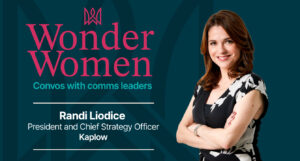By the Numbers: A snapshot of CCOs today
A look at who becomes a CCO — and how they get there.

Chief communications officers are having a moment.
Since the pandemic, their prominence has grown as communications emerged as a more visible, valued part of the C-suite.
But what does an average CCO look like?
Patino Associates published the “2024 Chief Communications Office Turnover Study,” delving into who holds these roles, how long they’ve held them and what might lead them to leave.
Patino Associates wrote that they were inspired to perform the research after noticing changes in the CCO industry and turnover that differed in key ways from those of other members of the C-suite.
The study pulled data on CCOs at Fortune 500 companies rather than relying on opinion surveys.
Here’s what they found.
Who are CCOs?
Perhaps unsurprisingly, in the female-dominated industry of communications, CCOs are overwhelmingly women. Sixty-six percent of CCOs at Fortune 500 companies are women, roughly in line with industry demographics. But compared to other C-suite officers, it’s a shockingly high number: Only 18.5% of similar CFOs are female and only 10.4% of CEOs are women. These demographics hold generally true even in the largest Fortune 50 companies (60% female CCOS), across public and private companies (63% versus 70%) and across industries.
All industries had at least 50% female CCOs.
Again, this is largely a reflection of the broader demographics in the communications profession. It’s a great victory for women, but also holds a note of caution: few CCOs currently have made the leap to the CEO role. Women could be at risk of being in a “pink ghetto” and crashing into a glass ceiling even if they make it to the C-suite.
How do you get to be CCO?
The study found that new CCOs are just as likely to be internal promotions as they are external hires: it’s a 50-50 split. This is, again, a notable aberration from the role of CEO, which is far more likely to be an internal promotion, with just 21.7% coming from outside the company.
Patino Associates attributes this to a difference in the skills between the outgoing CCO and their top leaders. “While this capability gap is sometimes perceived and sometimes actual, the good news is that internal candidates are increasingly involved in the search process,” they wrote in the report.
They blame this skills gap, real or perceived, on largely flat organizations without clear development plans to help train the next generation of CCOs.
“In many cases, the leading internal candidate is (or is viewed as) narrowly focused on one sub-functional area and might lack the strategic breadth to counsel senior executives in rapidly changing situations,” the report reads. “This is bolstered by our data, which shows that 55% of external hires into the CCO position had previous experience as a CCO.”
This should serve as a wake-up call to communicators to be active in not only training and cross-training in the comms department, but also advocating for organizational leaders and helping them be seen as diversified, well-rounded practitioners who are ready to step into the spotlight on their own one day.
The average tenure of CCOs
The current Fortune 500 CCO has been in the role for 4.6 years, the research found. Compare that to 7.1 years for CEOs. Annual turnover this year was just 8%, far lower than in 2022 (17%) and 2021 (15.2%). The report attributes this to “a natural pause after a super-cycle of investment in this functional area from 2019 to 2022” as well as a lower CEO turnover rate since CEOs often want to appoint their own comms head.
What it means for communicators
Whether you’re sitting in the CCO perch now or trying to chart your course to the C-suite, it’s important to understand the current environment. Focus on upskilling and being seen as a well-rounded practitioner in order to earn internal promotion — and look for ways to help your colleagues get to the top, too.
There’s more room at the table.
Allison Carter is editor-in-chief of PR Daily. Follow her on Twitter or LinkedIn.







